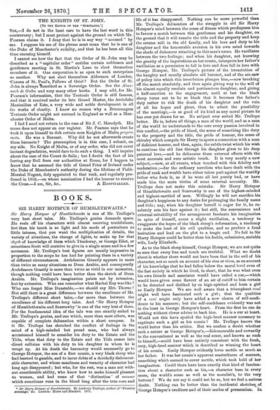THE KNIGHTS OF ST. JOHN.
go THE EDITOR OF THE "SPECTATOR:1 `SIEi—I do not in the least care to have the last word in this 'controversy; but I mast protest against the ground on which Mr. Pearson claims it. I deny that he is in any way " accused " by 'me. I suppose his use of the phrase must mean that he in one of 'the Duke of Manchester's sodality, and that he has been all this time excusing himself.
I cannot see how the fact that the Order of St. John may be -described as a " capitular order" entitles certain noblemen and gentlemen meeting in St. Martin's Lane to elect themselves members of it. One corporation is as open to such enterprises -as another. Why not elect themselves Aldermen of London, 'Canons of St. Paul's, Fellows of Oriel? But the Order of St. -John is always escribed as a Sovereign Order. See the Alma- Mach de Gotha and very many other books. I may add, for Mr. Pearson's information, that the Teutonic Order is still famous, -and that it received under its late Grand Master, the Archduke Maximilian of Este, a very wide and noble development in all "its works of charity. I know no reason why a Brummagem 'Teutonic Order might not succeed in England as well as a Man- -cheater Order of Malta.
I feel I need not return to the case of Sir J. C. Meredyth. His name does not appear on our register. Mr. Pearson says that he took it upon himself to dub certain men Knights of Malta proprio motu. He was a Baronet. Why did he not afterwards create them baronets ? The presumption is in this case, I submit, on .my side. No Knight of Malta, or of any order, who did not covet -instant degradation, would dare to do such a thing. I will inquire -about the case of the Count de Salis ; but I doubt the fact of his having any Bull from our authorities at Rome, for I happen to *now that he assumed the title of Grand Prior of Ireland under the Duke of Manchester's authority during the lifetime of Field- Marshal Nugent, duly appointed to that rank, and regularly pro- leased in 1859,—on whose nomination I had the honour to receive


































 Previous page
Previous page